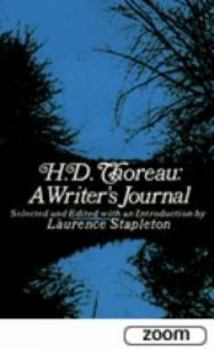H. D. Thoreau, a Writer's Journal
Select Format
Select Condition 
Book Overview
Timeless observations on the craft of writing, taken from Thoreau's journals - conditions required, method of creation, ideals and purpose of his art, and much more. Also, experiments in style which... This description may be from another edition of this product.
Format:Paperback
Language:English
ISBN:0486206785
ISBN13:9780486206783
Release Date:November 2011
Publisher:Dover Publications
Length:272 Pages
Weight:0.66 lbs.
Dimensions:0.6" x 5.4" x 8.0"
Customer Reviews
1 rating
The best of Thoreau's journal
Published by Thriftbooks.com User , 22 years ago
Because Henry David Thoreau's work is in the public domain, it's easy to run across any number of compilations of his most profound or most quotable words. Perhaps these mini-anthologies are simpler to digest than, say, every single page of _Walden_, or every one of the 14 volumes of his _Journal_. Let's face it: most people don't get or take the chance to read either one. So it's nice that Laurence Stapleton took the time to read the _Journal_ and select crucial parts for us to study. Here Thoreau is at his best in describing his neighbors or his walks around Concord and his art of observing Nature. His recordings are mostly made under what most people would consider adverse conditions: in fog, in rain, in snow, or at night. He notices phenomena reflected only in the water of a pond or the ice-covering of a wintry field. He is a practiced "seer," and his writing inspires the reader to see as well.His writing. Of course! This book is subtitled _A Writer's Journal_ for good reason. Stapleton specifically picked out many entries where Thoreau ruminates about his own writing and the creative process. To this end, this book reads like a 19th-century _Chicken Soul for the Writer's Soul_. Anyone who writes can identify with considerations like these:"The best you can write will be the best you are. Every sentence is the result of a long probation. The author's character is read from title-page to end. Of this he never corrects the proofs." (Feb. 28, 1841)"We cannot write well or truly but what we write with gusto. The body, the senses, must conspire with the mind. Expression is the act of the whole man, that our speech may be vascular. The intellect is powerless to express thought without the aid of the heart and the liver and of every member." (Sept. 2, 1851)"Write often, write upon a thousand themes, rather than long at a time, not trying to turn too many feeble somersaults in the air,--and so come down upon your head at last." (Nov. 12, 1851)"I wish that I could buy at the shops some kind of india-rubber that would rub out at once all that in my writing which it now costs me so many perusals, so many months if not years, and so much reluctance, to erase." (Dec. 27, 1853)"Time never passes so quickly and unaccountably as when I am engaged in composition, i.e. in writing down my thoughts. Clocks seem to have been put forward." (Jan. 27, 1858)"The more you have thought and written on a given theme, the more you can still write. Thought breeds thought. It grows under your hands." (Feb. 13, 1860)(Is he speaking to *us* or to *himself*?) We also see publication notes of the two books released during Thoreau's lifetime, _A Week on the Concord and Merrimack Rivers_ and _Walden_. We read discourses and ramblings that will later become essays like "Slavery in Massachusetts" and "A Plea for Captain John Brown." The latter are served without any intrusion from the editor, so the savvy reader might need to brush up on pre-Civil War





